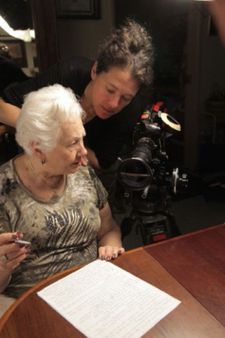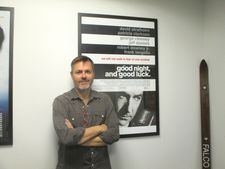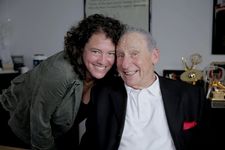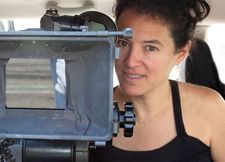![Ferne Pearlstein: "Renee [Firestone] and Steven Spielberg became very close."](/images/newsite/Ferne Pearlstein(1)_600.jpg) |
| Ferne Pearlstein: "Renee [Firestone] and Steven Spielberg became very close." Photo: Anne-Katrin Titze |
A highlight of the Tribeca Film Festival, Ferne Pearlstein's stunning The Last Laugh has Mel Brooks, Carl Reiner, Sarah Silverman, Robert Clary, Rob Reiner, Harry Shearer, Jeffrey Ross, Alan Zweibel, Gilbert Gottfried, Judy Gold, Larry Charles, David Steinberg, Susie Essman, Lisa Lampanelli and Hanala Sagal reflect on questions of free speech, taboos and time limits. Holocaust survivor Renee Firestone is the film's responsive centre.
Jerry Lewis's The Day The Clown Cried, James Moll's The Last Days and Paul Provenza's The Aristocrats open up the discussion and Brooks's comment on Roberto Benigni's Life Is Beautiful leads me to Son Of Saul star Géza Röhrig's response to Quentin Tarantino's Inglourious Basterds in my conversation with Ferne and her co-writer/co-producer Robert Edwards.
Mel Brooks who never included a swastika in his material until The Producers, makes an important distinction between jokes about Nazis and jokes about the Holocaust. The former were game early on - from Bugs Bunny's Herr Meets Hare to Ernst Lubitsch's To Be Or Not To Be, to Charlie Chaplin's The Great Dictator - the latter are still problematic.
 |
| Ferne Pearlstein with Renee Firestone writing her memoir |
The editing itself is often thought provoking. Brundibar, the children's opera performed in the camps, or the Cabaret Robert Clary performed in to survive - The Last Laugh does not make light of the subject but allows for a chorus of opinions.
One thing is certain, the combination makes you think, maybe more deeply and maybe in another direction about the Holocaust. Because the conversation on genocide is far from over.
Anne-Katrin Titze: Let's begin with the ending. I don’t remember the last time I was in such a roller coaster at the end of a film. There is the bathing suit story which is very heavy, then another joke referencing Walter Matthau.
Ferne Pearlstein: That’s in the credits, yeah.
AKT: The music is ’O sole mio and then switches to something from, I suppose, from the camps? Connected to Brundibar or a cabaret? What is that last choice?
FP: That’s in the credits? That is called The Lambeth Walk and it was one of the first Hitler parodies that was made in the Thirties, a very popular song.
Robert Edwards: Like a dance hall.
FP: And somebody had re-cut it [Charles A. Ridley of the British Ministry of Information] with all the marching …
RE: The German troops marching, parading …
FP: And re-cut it as if Hitler and the troops were dancing to the music.
AKT: So it’s less heavy than I thought! Because you show footage from the Theresienstadt film earlier, I thought you had music from that, perhaps.
FP: It was just an early Hitler parody. Only very few people will know what the music is.
AKT: It is extremely powerful because it brings us back there into the time. Where did you meet Renee [Firestone]?
 |
| Robert Edwards on The Day The Clown Cried: "Jerry’s film being in 1972 was way, way too close." Photo: Anne-Katrin Titze |
FP: I’m a cinematographer, I shoot in film, I wanted to find a visual story, a sort of verité thread to go with this so that it wasn’t just talking heads and clips. For a while, I landed on the second generation because they share a very dark sense of humor and jokes about their parents that they can tell each other but they don’t tell publicly. They can get away with it. But actually very hard to get them to tell them to me. I wasn't able to draw out that much, but of the people I found was Hanala Sagal, who wrote a book called My Parents Went Through the Holocaust and All I Got Was This Lousy T-Shirt. She is the one in the bathing suit scene with Renee.
AKT: In the café? I noticed her name.
FP: So what happened was, we got some money and nobody wanted to be the first person to be interviewed. So Bob's [Edwards] agent at CAA contacts Rob Reiner. We don't have a crew. All we have is a check in the bank. We're in New York, he's in LA. Rob Reiner says: "Sure, I'll do it a week from Wednesday." So in ten days we had to find a crew. Also we were looking for a survivor to film who has a sense of humor. We were also looking for a survivor who doesn't have a sense of humor about it or doesn't think it's okay.
AKT: And then you put them together in a gondola!
FP (laughs): Yes! So Hanala says, "I have the perfect person for you, Renee Firestone. She is incredible and her daughter Klara, started The Second Generation of Los Angeles." It was instant. We fell in love. They became family to us. Immediately we knew that they were going to be our story.
AKT: Renee's spirit is wonderful. You get that right from the beginning. I like that we don't know that we will be following her. She could be one of many voices. She emerges and flowers in the film. At the same time, maybe because she is such a great storyteller, I was doubting some of the stories.
 |
| Ferne Pearlstein with Mel Brooks in his office |
FP: You mean, maybe it's a facade, her happy …
AKT: Not that. She tells the story that she went to Munich after 53 years and someone told her about the death of her sister. I didn't know what to make of this. Can you explain?
FP: That is actually documented in Steven Spielberg's documentary. That was a scene I desperately tried to work in because it's a funny story, ironically. Spielberg was the executive producer of a film called The Last Days. It is about the Hungarian Jews in the last year of the war. It won the Academy Award and Renee and Steven Spielberg became very close. That film was taking her back to Auschwitz. She is doing an interview that day in the afternoon before they are going on this trip to Auschwitz. She gets in the mail from the archives in Auschwitz that paperwork that explains how her sister died. So she is a little shaken, she takes the paperwork into the production offices.
They say to her, "You are not going to believe this, the head of this institute where they did the experiments on your sister, we are interviewing him!" The same trip! So they do the interview with him. This is in the extras of the film. They set up a two person interview, she is sitting next to him and she is asking questions …
At a certain point he starts to pull off the microphone as he's had enough. And she says "Wait, can you just tell me what this paper says?" This is on camera and he says: "Oh, yes, your sister had some minor experiments done to her." So she asks "If they were minor experiments, then how did she die?" And he said: "Well, she was shot." She asks why and he literally says on camera " Well, we couldn't let her go back to the camp and tell people what we were doing. So we had to shoot her."
AKT: He was never put on trial?
FP: I don't know. I'd have to look it up. It's shocking. You just can't believe that he can be that disconnected.
 |
| Ferne Pearlstein behind the camera: "I wanted to find a visual story, a sort of verité thread ..." |
AKT: I imagine him like some of the perpetrators Claude Lanzmann filmed in Shoah. Of course, you couldn't put all of this in your documentary. You hint at all that lies underneath. Did you feel that you were circling around many tips of icebergs?
FP: Oh, yeah.
AKT: Who is the person saying he loves Life Is Beautiful after he hates everything else?
FP: That’s Abraham Foxman. He just retired. He was the head of the Anti-Defamation League, the ADL since its beginning. When Joan Rivers made that joke about Heidi Klum, for example, he wrote a press release, saying he thinks she went too far, saying it would be nice to have an apology. At the same time, people could hand him something and if he gave the seal of approval, it was very helpful.
AKT: His response is a great moment in the film.
FP: We did not see that coming. We were all very surprised.
RE: He does the contrary opinion to everything and everyone else in the film.
AKT: I did the opening night discussion with Géza Röhrig for the premiere of Son Of Saul. We met at a brunch for Danny Boyle's Steve Jobs and he said, the worst film …
Robert Edwards starts laughing.
AKT: No, not yet. Géza said the worst film for him is Inglourious Basterds. He hates it so much. Then I said, the one I detest is Life Is Beautiful. So you can imagine, I was jumping in my seat when Mel Brooks in your film is saying it’s the absolute worst film he’s ever seen. How did you feel about Life Is Beautiful?
_225.jpg) |
| Géza Röhrig on Son of Saul: "What we wanted to do is to make a movie that is uncompromising." Photo: Anne-Katrin Titze |
RE (in jest): Well, I think it’s the worst film I’ve ever seen. It must be, because Mel Brooks said so. As Ferne said, when it came out, it forced us to step back and think about this some more because we knew that its mere existence was going to change this whole discussion about comedy and the Holocaust. We set it aside until it settled down. In the film, Jerry Lewis’s film comes up. I haven’t seen it. Harry Shearer has seen it. It is superficially similar to Life Is Beautiful. Even though it’s a terrible film it won two Oscars. So it says something about time. Jerry’s film being in 1972 was way, way too close, even if it’s horrible.
AKT: Did you try to get to see it?
RE: It’s impossible.
FP: He has it locked up in a vault. He just made a deal to release it ...
RE: Ten years after he dies. I think he knows it’s of historical significance and wants it to be seen.
AKT: Just as a PS at the end - one of my favorite "revelations" in the film is that Cat Stevens was originally Steven Katz.
RE: Yeah, that's funny.
Coming up - The origins of The Last Laugh, The Aristocrats, Mel Brooks and the Spanish Inquisition, Art Spiegelman’s Maus in Miami and ’O sole mio with Renee Firestone in Las Vegas.
The Last Laugh will have its European premiere at the Munich Film Festival on June 29 at 9:30pm with Ferne Pearlstein and Robert Edwards expected to attend. One More Time, starring Christopher Walken and Amber Heard, directed by Robert Edwards and produced by Ferne Pearlstein will have its International premiere the same day at 7:00pm.





















